A Yakuza Primer: Everything You Need to Know About the Series Before Yakuza 6
From Yakuza 0 to Yakuza 5, here's the hypercondensed version of everything you need to know about Kazuma Kiryu before his final bow.
This article first appeared on USgamer, a partner publication of VG247. Some content, such as this article, has been migrated to VG247 for posterity after USgamer's closure - but it has not been edited or further vetted by the VG247 team.
This story originally published on March 16, 2018. With today's release of Yakuza 6, we've republished this primer to bring new players to the series up to speed.
Spoiler Alert: This article contains spoilers for every mainline Yakuza game. You've been warned.

Just as bewildering closet-sized apartments without kitchens exist in San Francisco, as do people who have probably never heard of Yakuza. Or worse yet, have heard of it, but know nothing of its finer details. The Yakuza series, for the unenlightened, is a Japanese game series from Sega. It's a sprawling crime drama that's gotten a reputation for not just its famously voice-acted characters and deep story, but for its careful balance of humor too.
Last year, the Yakuza series became a smash hit in the west for the first time in the decade plus the series has been around. Social media coupled with word of mouth helped the prequel installment Yakuza 0 achieve solid sales and fan adoration everywhere. Whether players preferred playing as the sarcastic Goro Majima or the dour Kazuma Kiryu, or they had more fun mainlining the most dramatic tale about real estate ever scribbled rather than singing a cheerful tune at karaoke, there was something for everyone in Yakuza 0's envisioning of 1980s Japan.
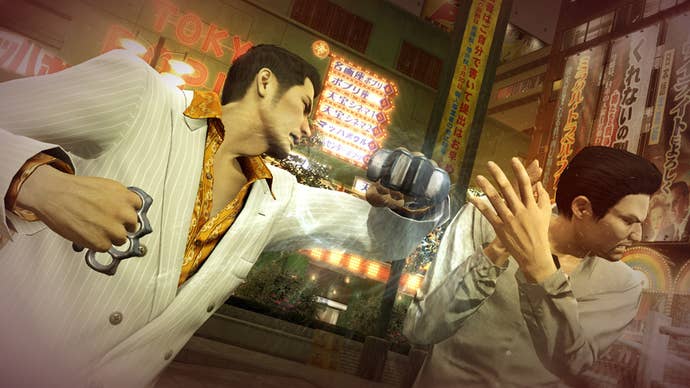
And soon, on April 17, Yakuza 6: The Song of Life will release on PlayStation 4. It's the first Yakuza game unshackled by the constraints of running on an engine that ran games on both PlayStation 3 and PlayStation 4. Gone too is the series' recent trend of having multiple protagonists. Yakuza 6 is focused: it's ending main hero Kiryu's tale, and that's all.
Yakuza 6 suffered a last minute delay earlier this year, pushing the game forward to April instead of its original March release date. The move was for "business reasons," meaning it's likely that Sega wants to kick off the next fiscal year, which starts April 1, with a bang; though Sega has yet to detail the real reasoning for the release date push.
Regardless, unless you have no job or school and don't sleep at all, it's unlikely that you'll be able to power through every single Yakuza game in time for the conclusion to Kiryu's story. To help get you up to speed on everything Yakuza, we dove into the series' bumpy past. We watched YouTube videos, played games, read dense fan fiction mapped out by fans online. (Just kidding on the latter.) Yakuza, as a series, boasts dozens of characters and spin-off games, so we broke down all the essential information you'll need before you dive into Yakuza 6 next month.
What is Yakuza?
yakuza [yah-koo-zah]
noun, plural yakuza.
1. any of various tightly knit Japanese criminal organizations having a ritualistic, strict code of honor.
2. such organizations collectively.
3. a member of such an organization; gangster.
The word yakuza has a muddy history. The most common origin story points to the Japanese card game Oicho-Kabu, and a particularly bad hand a player can be dealt in it. Eight-nine-three, pronounced as ya-ku-sa, is a useless, embarrassing hand. It's an outsider to what would be considered a good hand. As such, the word yakuza, allegedly, was born of these gambling groups. Organized crime syndicates in Japan were already cast as outsiders, and the word yakuza was adopted in turn.
Even with a largely bad reputation, the yakuza have done some good for their communities. When disaster struck after the 2011 T?hoku earthquake and tsunami, the yakuza launched relief efforts to those affected, sending food and water to the Tokyo and Kobe regions. In the video game series Yakuza, hero Kiryu, alongside other friends, are paid the same glance: that not every outsider to society is purely evil.
That said, the Yakuza series is still a brawler at heart. Throughout the Yakuza games, Kiryu and the other playable protagonists that appear throughout the series speak mostly with their fists. It's a violent way of communication, but hey, it gets the job done at the end of the day, and Kiryu has been able to "speak" volumes within the fictional neighborhood of Kamurocho in Tokyo and beyond because of it.
Kiryu and the other protagonists that grace the series even have fun from time to time. They help passersby with their problems, like helping a college student study for a test or helping a dominatrix get confidence in her profession. There's also a medley of side activities players can partake in, like passionate karaoke, playing old Sega arcade games like Fantasy Zone, or winning a round of bowling and hiring a chicken as your coach. In Yakuza, zaniness and seriousness are balanced in equal measure, and the games never feel at odds between its two tones. In fact, it flourishes because of it, never burdened by wherever the story leads you, whether it's down an alley for a fight or to a cult to infiltrate in your free time. The Yakuza series is commonly compared to Shenmue for this reason, only it's—sorry Shenmue—less boring.
Who are the Yakuza?
At the core, the story has always followed Kazuma Kiryu, an orphan turned bad boy with a shimmering heart of gold. In Yakuza 0, released for PS3 and PS4 back in 2015 in Japan, he's fresh-faced and 20 years old; a newbie to the Dojima Family, the Kansai region-bound Tojo Clan's most powerful subsidiary, and its adjoining scene of tumbling criminals. In this scene, he's best buddies with Akira Nishikiyama, who he grew up with at an orphanage. Nishikiyama is someone willing (or as we learn, maybe not so willing) to have Kiryu's back when Kiryu finds himself kicked out of the Dojima Clan after the death of a man he beat and collected money from—a man that Kiryu did not kill, contrary to others' belief. Nishikiyama double crosses Kiryu a couple times over the course of the game, always backing down at the last moment. He has a moment of redemption at the end though, when he teams up with Kiryu in a triumphant scene where they punch some dudes and bare their giant back tattoos.
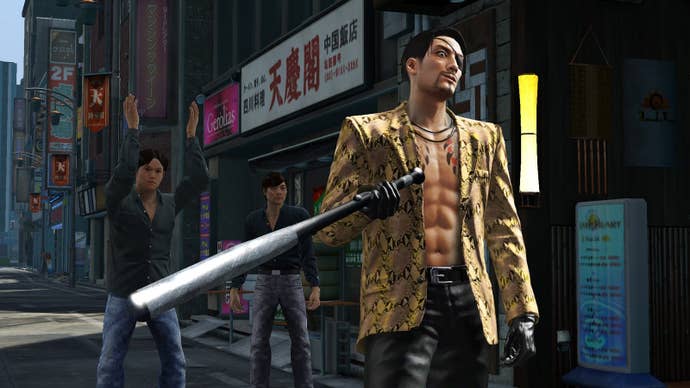
Meanwhile in Yakuza 0, Kiryu's series-long frenemy Goro Majima is given an introduction too, before the two even cross paths. Majima's only a little bit older than baby-faced Kiryu, and he's only a tad more seasoned to boot. At the start of Yakuza 0, he's an ex-yakuza, running a lavish cabaret club under the Omi Alliance, trying to earn his way back into the Tojo Clan. (His introduction, quite literally, sees a drunk man at his club swinging punches at him as he dodges him effectively and even offers him a towel. Majima is cordial, always.)
A hop, skip, and protecting a blind woman who was supposed to be Majima's assassination target later, Majima goes through a rollercoaster in Yakuza 0. His and Kiryu's journeys are tethered to an "Empty Lot" in Kamurocho, where the murder Kiryu's accused of took place and where yakuzas are fighting over who gets the deed for the land (which happens to, you guessed it, belong to the blind girl Makoto). As critic Astrid Budgor writes for Heterotopias, "The lot is a void: as a crime scene it is marked by the stain of death, of absence, but as a development site it is desirable for that same emptiness." The lot, essentially, doesn't really mean anything. For the sprawling narrative of Yakuza though, it serves as a meaningless void that intrinsically binds Kiryu and Majima's infinite destinies together, whether they like it or not. Sure, the game fleshes out fan favorite Majima in the process—known for his antagonistic, sillier antics in later games—but more so it gives fans a reason to see a more tender side of the Mad Dog of Shimano for a change.
In Yakuza 1 (or its remake Yakuza Kiwami, which smooths out the confusing plot with additional cutscenes), Kiryu finds himself fresh out of prison after taking the blame for a murder he didn't commit. He's 37 now, long aged from the young adult he once was in Yakuza 0. Quickly, he finds himself embroiled in new drama: former best buddy Nishikiyama, who he took the blame for in the murder of their boss Sohei Dojima after Dojima had kidnapped Kiryu's lover Yumi, isn't as friendly to Kiryu as he once was. (Which is horrible, considering Kiryu spent 10 years in prison for him because of brotherhood or whatever.)
Kiryu happens upon accidental custody of the young girl Haruka, who is searching for her lost mother and happens to be the target of the Tojo Clan. It turns out that Haruka is the daughter of his long lost love Yumi. Kiryu fights a bunch of people, bonds with Haruka, and learns the truth about her identity. By the end of Yakuza, tragedy strikes. Yumi and Nishikiyama end up dying; while the former takes a bullet meant for Kiryu after Haruka also jumps in front of him, a bullet that's fired by the father of Haruka: corrupt politician Kyohei Jingu, the latter also sacrifices himself to save Kiryu and Haruka in a moment that harkens back to his allegiance-switch in Yakuza 0. Yumi dies in Kiryu's arms. Nishikiyama, already suffering from a mortal wound, dies in a safe filled with money as a bomb goes off, taking out Jingu with him. By the end of all the death and drama, Kiryu reckons with his own guilt and considers returning to prison, before assuming the role of Haruka's guardian. Even after losing both her parents in a horrible ways, she at least has Kiryu now! So all's not bad. Until Yakuza 2 kicks things into gear.
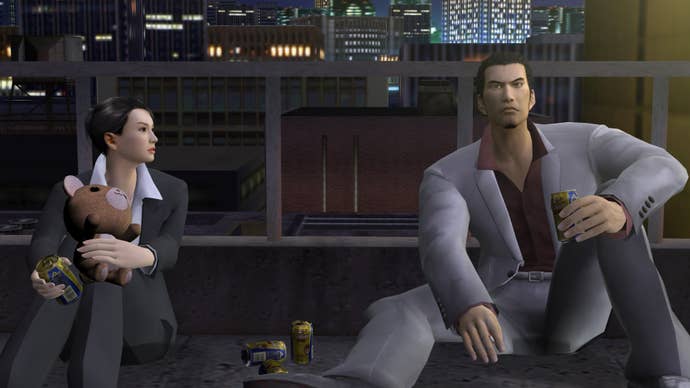
In Yakuza 2 (or Kiwami 2, which has yet to be confirmed for western release), Kiryu's been living in peace away from the yakuza lifestyle with Haruka (after stepping down from a very, very brief stint as fourth Chairman, also known as the leader of the Tojo Clan). Of course, a murder pulls now 38-year-old Kiryu back into the yakuza world, after the fifth Chairman of the Tojo Clan is assassinated following the tension between rival yakuza gangs. Kiryu travels across Japan to recruit his friend, Daigo Dojima, to take the Chairman's place. After making a new shortlived enemy and a friend in a detective along the way, Daigo Dojima steps up by the game's end as the sixth Chairman to head the Tojo Clan.
At the start of Yakuza 3, Kiryu seems to have attained peace again. He runs the Sunshine Orphanage alongside the young Haruka in Okinawa. He's 40 now, his yakuza years long in the past. Until they aren't, again. (Poor Kiryu never gets to enjoy his retirement.) After the local Ryudo family who own the land attempts to evict Kiryu's orphanage, and Kiryu knocks some sense into them in turn. A short time (and more dudes punched) later, Kiryu learns that Dojima and the Tojo Clan at large were inadvertently responsible for the attempt to evict the orphanage after the Clan's attempt to scavenge Okinawa for a potential hotel-resort expansion. Dojima and Nakahara, the Ryudo family boss who owns the land beneath Sunshine Orphanage, reassure Kiryu that his orphanage's land will remain untouched.
Then, again, tragedy hits. Kiryu's walking with Haruka through town when he's confronted by Goh Hamazaki, the game's chief antagonist, who stabs him and blames him for his misfortunes. Kiryu nearly dies from this incident, but is shown recovering at the orphanage afterwards. Yakuza 4 picks up where this game left off, but with a twist: it's not just Kiryu that players get to see the story play out as, but four characters in total, all with their own full supporting casts. Kiryu is among them, of course, but loan shark Shun Akiyama, Sasai Family member (and good friend of fan favorite character Majima) Taiga Saejima of the Tojo Clan, and policeman Masayoshi Tanimura join the fray. Yakuza 4 is when the story gets a little bit too convoluted, throwing dozens of new characters into poor Kiryu's life when he just wants to chill out with the orphans he's raising.
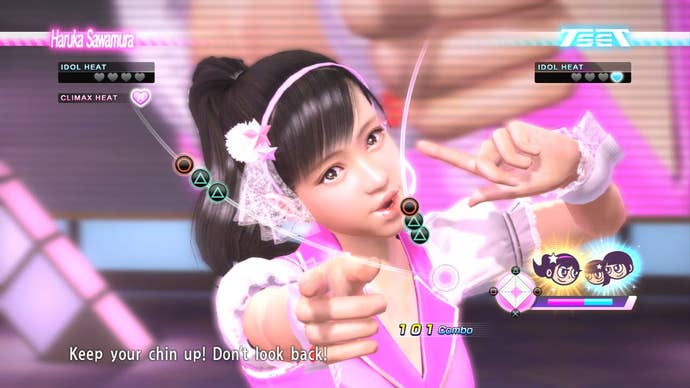
In an effort of brevity, I'll do my best to condense Yakuza 4's wide scope of events by limiting it to Kiryu's experience. One year after the events of Yakuza 3, Kiryu finds himself rehabilitating a man who washed up on the beach who escaped from prison. This person is revealed, eventually, to be Taiga Saejima. After some drama and reluctance from Kiryu, Saejima is given tickets to Tokyo by the kind-hearted Haruka, who had discovered him initially. A short time later, another man turns up at the beach: it's the man who helped Saejima escape prison, who also tried to murder Kiryu at the end of Yakuza 3. Yikes.
The roles switch in this moment. Where once Haruka was the more compassionate host nursing an injured man to health, now shockingly Kiryu's the kinder person. Haruka doesn't even want Hamazaki near the orphanage after what he did to Kiryu. Hamazaki earnestly apologizes to Kiryu for the pain he inflicted on him. Eventually in town, Kiryu and Hamazaki meet Yasuko Saejima, who once went by the name Lily during her search for her brother Taiga. Eventually, they're ambushed by the prison guard Saito, where Hamazaki stays back to hold them off while Kiryu and Yasuko flee to Kamurocho. Hamazaki dies of the wounds he sustains, and Haruka keeps his body at Sunshine Orphanage so that she and Kiryu can give him a proper burial. It's not the only death of the game either: Yasuko dies too after taking out Isao Katsuragi in the process, repaying the favor of Taiga by taking a bullet for him after he saved her life long ago.
Yakuza 5 begins in a shocking way, given the trend of Kiryu's continued interrupted retirement of sorts. In Yakuza 5, Kiryu's given up running the orphanage and is living in Fukuoka as a taxi driver (complete with a ridiculous minigame, of course, though it's no Crazy Taxi). Elsewhere, Haruka's trying to make it as a J-Pop idol in Osaka. She's even one of the game's five playable heroes, only her street brawls are swapped with impromptu dance battles—which is way better and there should have been an entire spin-off starring Haruka in this era, honestly. Haruka's a teenager reckoning with her blossoming fame, while missing her dad-figure Kiryu, in parallel, Kiryu is solemnly living a mundane life and feeling the same way (there are a few scenes where Kiryu catches Haruka on television as an idol where he sighs, knowing deep down that he misses her company).
The game also stars two other familiar protagonists: Taiga Saejima and Shun Akiyama, as well as new character Tatsuo Shinada, a former pro baseball player turned entertainment writer. While the game boasts the most bloated story of all the games—with drama that ends up feeling inconsequential to Kiryu—the subplot of Kiryu and Haruka finding their way back to one another is where the game's heart lies. And when they're finally reunited, after Haruka makes a bold declaration in the midst of a concert that the man who raised her is a member of the yakuza and is kind, despite the reputation that name carries. She then retires immediately from the entertainment industry, running off stage to find Kiryu again. She finds him on a snowy street, following yet another giant battle (as Yakuza games tend to end on), bleeding from his wounds.
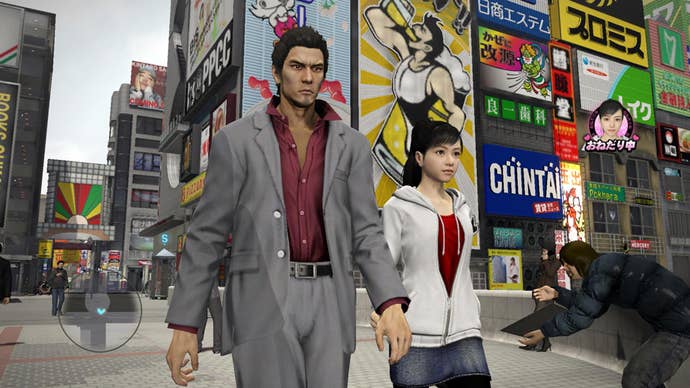
Why Do People Love Yakuza So Much?
No matter how daunting the overall scope of the Yakuza series is, with all its characters and alliances and yakuza clans, overall, it doesn't really matter. Each game is, for the most part, completely standalone, jogging players up to speed with callbacks and rehashing what the characters are up to at this moment in time. More than any of them, Yakuza 0, the prequel, benefits the most from having played more than just one game in the series, as seeing familiar characters in their younger states is endearing fan service to the Nth degree. The only real story that matters at the end of it is the father-daughter like relationship between Kiryu and Haruka, a relationship that's going to be explored in depth with Yakuza 6—to the point where prominent side characters may even mostly fade deep into the background.
So yeah, that's a lot of games, and a lot of words about them. And trust me, there are characters, subplots, and other things left out for the sake of servicing the arc of Kiryu's grand journey. In summation, Kiryu just wants to chill out with his faux-daughter in peace, but life will never let him. Kiryu's left the yakuza about as many times as Studio Ghibli's Hayao Miyazaki has "retired" from animation. When I spoke to Yakuza 6's localization producer a couple months ago, he told me that the prominent theme of Yakuza 6 is fatherhood in all shades, from being a father to Haruka to (twist!) being a surprise grandfather to her child. Kiryu is an example that not all "criminals" are abhorrent human beings; some do the best they can with the cards they're dealt in life. Hopefully by the end of Yakuza 6, Kiryu can actually live the peaceful, uninterrupted life at the orphanage he's always dreamed of.
People love Yakuza because of the characters, the (as you may have guessed) twisty story, the tightrope the team is able to balance with inane side quests and minigames with a dense crime tale at its center. While Yakuza 6 will see the end of Kiryu's decades-long journey, in the west, it kinda feels like only the beginning of Yakuza's future. With new games planned without the familiar stoic hero, the sky is the limit for Yakuza at this point. Let's hope they pack the next installment with even more classic Sega arcade games.
And who knows, with the success of Yakuza 0 and the probable-upcoming eventual localization of Yakuza Kiwami 2 (which adds Majima back as a playable character like in Yakuza 0), maybe Majima can finally get his own game or something. Or maybe we can get a more robust, full game of Haruka trying to be a J-Pop idol. As I wrote, sky's the limit. For help with Yakuza 6, check out our Yakuza 6 guide.

